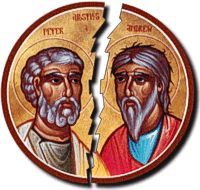How much influence did the Pope have in Byzantium?
 Jack asks how much influence the Pope had in Byzantium before the Great Schism and how that crisis affected the Empire.
Jack asks how much influence the Pope had in Byzantium before the Great Schism and how that crisis affected the Empire.
Constantinople’s attitude towards Rome was always a complicated one. On the one hand, the bishop of Rome had a uniquely respected place in the early church. Peter, who had been entrusted with the ‘keys to the kingdom of heaven’ had founded its church, and as such it had far more prestige than the relatively late church of Constantinople. The Pope was the ‘first among equals’, due a special reverence and respect. On the other hand, however, Constantinople was the residence of the emperor- God’s regent on earth who looked after the physical well-being of the faithful in the same way the church looked after its soul. They resented the increasingly authoritarian claims of the Roman church as it moved from ‘first among equals’ to simply ‘first’. The Orthodox view was that each of the five major bishops of the Church (Rome, Antioch, Jerusalem, Alexandria, and Constantinople) had an equal voice- Rome was in effect an elder statesman not a dictator.
As the East and West went their separate ways politically, the Pope became a useful tool for the Emperor to use if he disagreed with his Patriarch. In the case of Leo the Wise, for instance, when his church rejected his bid for a fourth marriage, he referred the matter to the Pope, knowing that the pontiff would eagerly grant him a marriage in exchange for publicly ‘overruling’ the Patriarch. This was a political gambit- nothing more. But it does show that the Pope’s opinion still mattered- the ‘senior’ bishop of Christendom had weighed in and- over the Patriarch’s objection- Leo got his 4th marriage.
As for the Great Schism, 1054 is a nice, clean date for historians, but is relatively meaningless. As Sir Steven Runciman wrote ‘a schism only exists when a majority of individuals believe it does.’ Clearly this wasn’t the case in the 11th century. A hundred years after the ‘Schism’ the emperor Manuel Comnenus wrote to the Pope, offering to act as the ‘sword arm of the Church’ in the reconquest of Italy from the Normans. The Pope accepted- hardly the actions of people who considered the other side heretical. What really put the nail in the coffin of Church unity was the 4th Crusade. After that tragedy, there was no real possibility of reunion. As the Byzantines famously put it- ‘better the Sultan’s turban than the Pope’s mitre.’ While the Orthodox church maintains even today that they will welcome the Pope back into his favored position if he admits his errors, practically speaking all papal influence on Byzantium ceased in 1204.